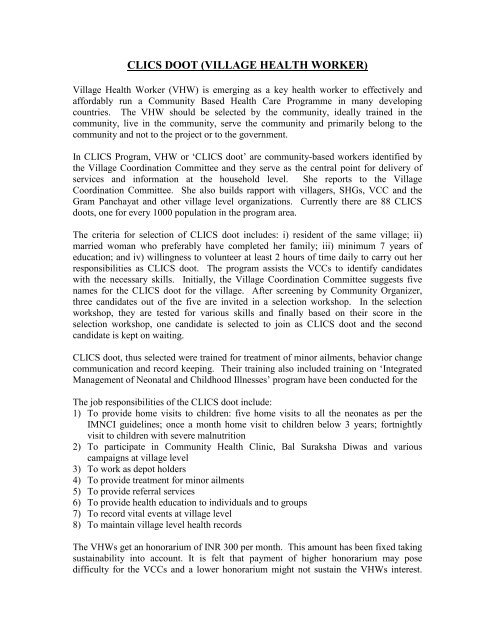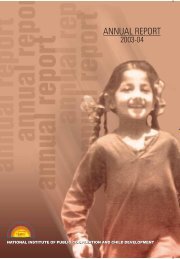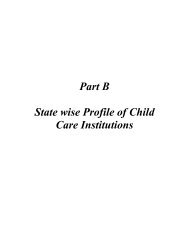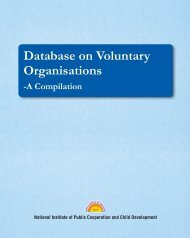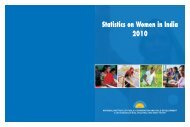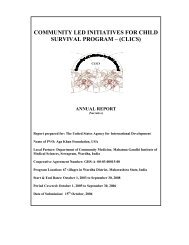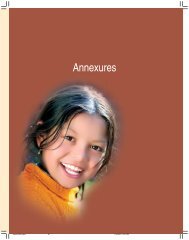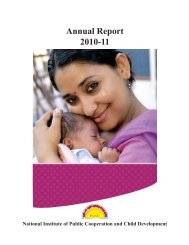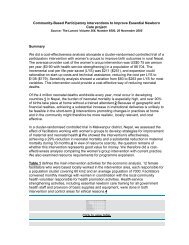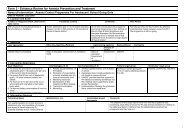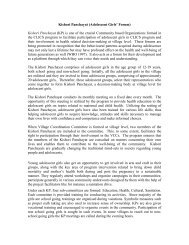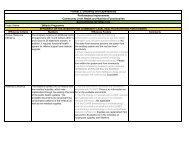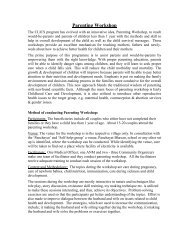CLICS DOOT (VILLAGE HEALTH WORKER) - Nipccd
CLICS DOOT (VILLAGE HEALTH WORKER) - Nipccd
CLICS DOOT (VILLAGE HEALTH WORKER) - Nipccd
Create successful ePaper yourself
Turn your PDF publications into a flip-book with our unique Google optimized e-Paper software.
<strong>CLICS</strong> <strong>DOOT</strong> (<strong>VILLAGE</strong> <strong>HEALTH</strong> <strong>WORKER</strong>)<br />
Village Health Worker (VHW) is emerging as a key health worker to effectively and<br />
affordably run a Community Based Health Care Programme in many developing<br />
countries. The VHW should be selected by the community, ideally trained in the<br />
community, live in the community, serve the community and primarily belong to the<br />
community and not to the project or to the government.<br />
In <strong>CLICS</strong> Program, VHW or ‘<strong>CLICS</strong> doot’ are community-based workers identified by<br />
the Village Coordination Committee and they serve as the central point for delivery of<br />
services and information at the household level. She reports to the Village<br />
Coordination Committee. She also builds rapport with villagers, SHGs, VCC and the<br />
Gram Panchayat and other village level organizations. Currently there are 88 <strong>CLICS</strong><br />
doots, one for every 1000 population in the program area.<br />
The criteria for selection of <strong>CLICS</strong> doot includes: i) resident of the same village; ii)<br />
married woman who preferably have completed her family; iii) minimum 7 years of<br />
education; and iv) willingness to volunteer at least 2 hours of time daily to carry out her<br />
responsibilities as <strong>CLICS</strong> doot. The program assists the VCCs to identify candidates<br />
with the necessary skills. Initially, the Village Coordination Committee suggests five<br />
names for the <strong>CLICS</strong> doot for the village. After screening by Community Organizer,<br />
three candidates out of the five are invited in a selection workshop. In the selection<br />
workshop, they are tested for various skills and finally based on their score in the<br />
selection workshop, one candidate is selected to join as <strong>CLICS</strong> doot and the second<br />
candidate is kept on waiting.<br />
<strong>CLICS</strong> doot, thus selected were trained for treatment of minor ailments, behavior change<br />
communication and record keeping. Their training also included training on ‘Integrated<br />
Management of Neonatal and Childhood Illnesses’ program have been conducted for the<br />
The job responsibilities of the <strong>CLICS</strong> doot include:<br />
1) To provide home visits to children: five home visits to all the neonates as per the<br />
IMNCI guidelines; once a month home visit to children below 3 years; fortnightly<br />
visit to children with severe malnutrition<br />
2) To participate in Community Health Clinic, Bal Suraksha Diwas and various<br />
campaigns at village level<br />
3) To work as depot holders<br />
4) To provide treatment for minor ailments<br />
5) To provide referral services<br />
6) To provide health education to individuals and to groups<br />
7) To record vital events at village level<br />
8) To maintain village level health records<br />
The VHWs get an honorarium of INR 300 per month. This amount has been fixed taking<br />
sustainability into account. It is felt that payment of higher honorarium may pose<br />
difficulty for the VCCs and a lower honorarium might not sustain the VHWs interest.
During the initial period, the payments are being done by the program. However, it is<br />
envisaged that from the third year onwards the VCC will find out an alternate mechanism<br />
for remuneration of the <strong>CLICS</strong> doot. The contribution of the VCCs will be scaled up<br />
gradually to the point where the VCC is able to sustain the <strong>CLICS</strong> doot after the program<br />
funding stops. It is anticipated that VHW could also generate her own income by<br />
charging a service fee under the respective VCC's supervision.<br />
There are several cases where timely referral and care have saved lives of children and<br />
mothers and eased problems of the villagers.


